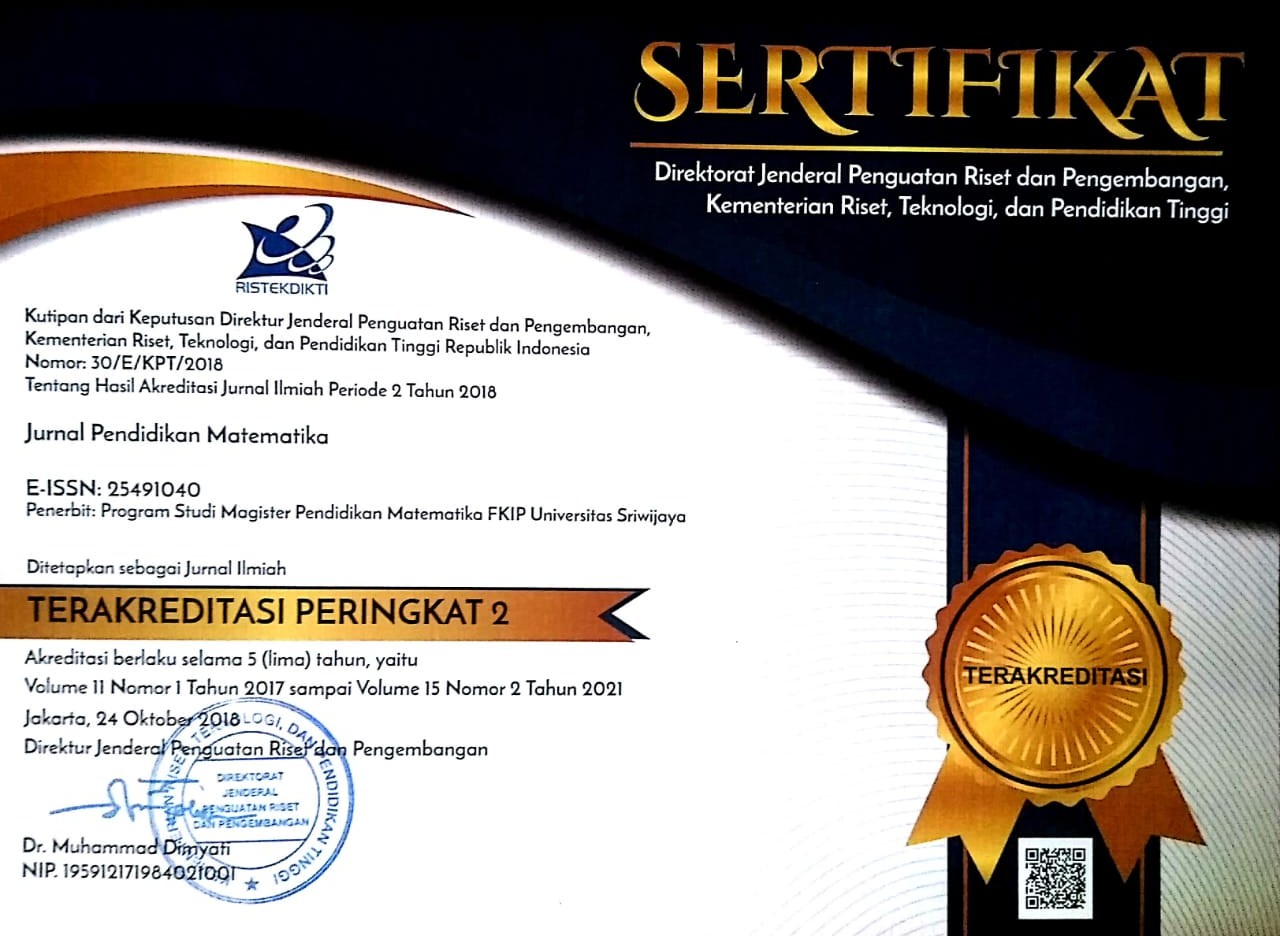Exploring the Decision-Making Process of Pre-Service Teachers in Solving Mathematics Literacy Problems
Abstract
Students’ lack of mathematical literacy skills is also accompanied by the lack of mathematical literacy skills of most pre-service teachers. The purpose of this study is to investigate the decision-making process conducted by pre-service teachers in solving mathematical literacy problems. This qualitative descriptive study involved two subjects taken from 42 pre-service mathematics teacher students. Each subject was identified based on their pattern in solving mathematical literacy problems correctly and inappropriately. Data were collected through tests of mathematical literacy problems and test-based interviews. The results showed that there were differences in the decision-making process done by the students with correct and incorrect problem solving, namely: (1) building ideas, having three vs. two solution ideas, formulating and employing correctly vs. formulating correctly and employing inappropriately; (2) clarifying ideas, giving reasons for each idea vs. having wrong reasons due to calculation errors, interpreting correctly vs. interpreting incorrectly; and (3) assessing the reasonableness of an idea, providing logical reasons with one choice vs. logical reasons with one choice but less sure. Based on the findings, it can be concluded that the creativity of prospective teacher students in building ideas is still low and reasoning in expressing and choosing ideas is still weak, causing immature decision making. The finding of this study provides suggestions for educators to provide structured assignments and for other researchers to find factors influencing pre-service teachers’ decision-making in mathematics problem-solving to improve pre-service teachers’ decision-making skills.
Keywords
Full Text:
PDFReferences
AACTE & Partnetship For 21st Century Skill. (2010). 21St century knowledge and skills in educator preparation. Blackboard, ETS, Intel, National Education Association, Microsoft and Pearson. America. https://doi.org/10.1787/9789264193864-en
Abdillah, Nusantara, T., Subanji, Susanto, H., & Abadyo. (2016). The students decision making in solving discount problem. International Education Studies, 9(7), 57–63. https://doi.org/10.5539/ies.v9n7p57
Apriandi, D., Murtafiah, W., Ayuningtyas, A. D., & Rudyanto, H. E. (2020). Solving shortest path problems using mathematical literacy skill figured out by pre-service teachers. Journal of Physics: Conference Series, 1613(1). https://doi.org/10.1088/1742-6596/1613/1/012016
Damayanti, N. K. A., Suarsana, I. M., & I Putu Pasek Suryawan. (2017). Improving students' mathematical literacy ability through the application of collaborative learning model [in Bahasa]. Wahana Matematika dan Sains: Jurnal Matematika, Sains, Dan Pembelajarannya, 11(1), 33–42. https://doi.org/http://dx.doi.org/10.23887/wms.v11i1.11845
Dianty, A. P., Supeno, & Astutik, S. (2020). Decision making ability of high school students in guided inquiry learning [in Bahasa]. Jurnal Pembelajaran Fisika, 9(1), 1–10. https://doi.org/https://doi.org/10.19184/jpf.v9i1.17935
Griffith, R., & Groulx, J. (2014). Profile for teacher decision making: A closer look at beliefs and practice. Journal of Research in Education, 24(2), 103–115.
Güler, H. K., & Çi?dem Arslan. (2019). Mathematical competencies required by mathematical literacy problems. Malaysian Online Journal of Educational Sciences, 7(2), 57–70.
Khoirudin, A., Dwi Styawati, R., & Nursyahida, F. (2017). Profile of mathematical literacy ability of students with low mathematical ability in solving problems in the form of PISA [in Bahasa]. Aksioma, 8(2), 33. https://doi.org/10.26877/aks.v8i2.1839
Koh, J. H. L., Chai, C. S., Wong, B., & Hong, H.-Y. (2015). Design thinking for education: conceptions and applications in teaching and learning. New York: Springer.
Kosko, K. W. (2016). Preservice elementary mathematics teachers decision making: The questions they ask and the tasks they select. Proceedings of the 38th annual meeting of the North American Chapter of the International Group for the Pyschology of Mathematics Education (pp. 1341–1344).
Lange, J. De. (2006). Mathematical literacy for living from OECD-PISA perspective. Tsukuba Journal of Educational Study in Mathematics, 25, 13–35.
Lestari, N. D. S., Juniati, D., & Suwarsono., S. (2019). The role of prospective mathematics teachers’ knowledge of content and students in integrating mathematical literacy. New Educational Review, 57. https://doi.org/https://doi.org/10.15804/tner.2019.57.3.12
Lestari, N. D. S., Juniati, D., & Suwarsono, S. (2018). Gender Differences in prospective teachers’ mathematical literacy: problem solving of occupational context on shipping company. Journal of Physics: Conference Series, 1008(1). https://doi.org/10.1088/1742-6596/1008/1/012074
Miles, M., Huberman, M., & Saldana, J. (2014). Qualitative data analysis. european journal of science education (Vol. 1). https://doi.org/10.1080/0140528790010406
Ministry of Education and Culture. (2020). National Assessment and Program for International Student Assessment [in Bahasa]. Jakarta.
Muhtarom, Juniati, D., & Siswono, T. Y. E. (2017). Exploring beliefs in a problem-solving process of prospective teachers’ with high mathematical ability. Global Journal of Engineering Education, 19(2), 130–136.
Murtafiah, W., Sa’dijah, C., Chandra, T. D., & Susiswo, S. (2019). Decision making of the winner of the national student creativity program in designing ICT-based learning media. TEM Journal, 8(3), 1039–1045. https://doi.org/10.18421/TEM83-49
Murtafiah, W., Sa’dijah, C., Chandra, T. D., Susiswo, & Zayyadi, M. (2020). Novice and experienced mathematics teachers’ decision making process in designing math problem. Journal of Physics: Conference Series, 1464(012030), 1–6. https://doi.org/10.1088/1742-6596/1464/1/012030
OECD. (2010). PISA 2012 mathematical framework. Paris: OECD Publishing.
OECD. (2013). PISA 2012 assessment and analytical framework: Mathematics, reading, science, problem solving and financial literacy. OECD Publishing. https://doi.org/http://dx.doi.org/10.1787/9789264190511-en
OECD. (2015). PISA 2015 results (Volume I) (Vol. I).
OECD. (2018). Pisa 2015 results in Focus. Retrieved from http://www.oecd.org/pisa
Ojose, B. (2011). Mathematics literacy : Are we able to put the mathematics we learn into everyday use?. Journal of Mathematics Education, 4(1), 89–100.
Ontario Ministry of Education. (2016). 21st century competencies. Toronto: Queen’s Printer for Ontario.
Sa’dijah, C., Murtafiah, W., Anwar, L., Nurhakiki, R., Tejo, E., & Cahyowati, D. (2021). Teaching higher-order thinking skills in mathematics classrooms: Gender differences. Journal on Mathematics Education, 12(1), 159–180. https://doi.org/http://doi.org/10.22342/jme.12.1.13087.159-180
Swartz, R. J., Fischer, S. D., & Parks, S. (1998). Infusing the teaching of critical and creative thinking into secondary science: A lesson design handbook. New Jersey: Critical Thinking Books & Software.
Swartz, R., & Reagan, R. (1998). Infusing critical and creative thinking into content instruction. Washington: The National Center for Teaching Thinking.
Wang, Y., & Ruhe, G. (2007). The cognitive process of decision making. Journal of Cognitive Informatics and Natural Intelligence, 1(June), 73–85. https://doi.org/http://dx.doi.org/10.4018/jcini.2007040105.
DOI: https://doi.org/10.22342/jpm.15.2.13908.145-160
Jl. Srijaya Negara, Bukit Besar
Palembang - 30139 Indonesia
Jurnal Pendidikan Matematika is licensed under a Creative Commons Attribution-NonCommercial-ShareAlike 4.0 International License.
Indexed in:


